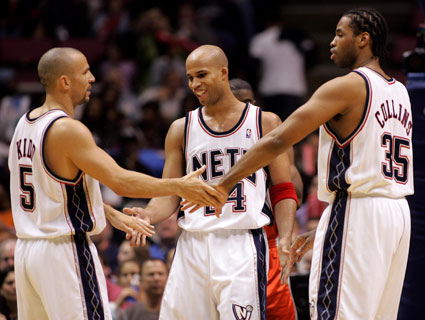
NBA center Jason Collins.Harry E. Walker/MCT/ZUMAPress
Jason Collins began his coming out essay in Sports Illustrated with the words, “I’m a 34-year-old NBA center. I’m black. And I’m gay.”
There’s a reason Collins chose to mention he was black and gay—as though those two things were in as much tension as being the first openly gay male athlete active in one of America’s favorite sports—but it deserves a more thoughtful examination than the one offered by Charles P. Pierce in Grantland. Pierce, feigning a familiarity with the history of the civil rights movement and the black church belied by the weakness of the evidence he’s able to provide, writes:
His explanation for his decision to come out is rich with the historical “dual identity” forced on black Americans under Jim Crow, and the similar dynamic within which he lived as a gay man. Homophobia in the black community—indeed, even among the leaders of the civil rights movement of the 1960s—was some of the most virulent and stubborn of all, and there are still some who resent the equation of the gay rights movement with their struggle. In his announcement in Sports Illustrated, then, Collins gave every indication that he’s fully aware of the historic and cultural dimensions of his decision, and of the sacrifices made elsewhere so that he would be free to make it now.
Look, man: It’s called “double consciousness,” not “dual identity,” and it’s an intellectual concept applicable to black existence in America prior to Jim Crow and after its demise. “Dual identity” is what Batman has. And Pierce’s mangling of W.E.B. DuBois is the least of the problems with this paragraph.
There was certainly homophobia in the civil rights movement—but in the 1950s and ’60s, American society was homophobic, and Pierce offers no evidence that the civil rights movement was more homophobic than any other American institution during that period. Given that one of the architects of the civil rights movement’s nonviolent strategy was Bayard Rustin, it was arguably less homophobic than much of society at the time. With a few notable exceptions, surviving leaders of the movement—from Rep. John Lewis (D-Ga.) to Rev. James Lawson to Jesse Jackson to Julian Bond—are all in favor of gay and lesbian rights.
There’s also little evidence for the proposition that black homophobia is “the most virulent and stubborn of all.” Black folks, who were disenfranchised for centuries, didn’t put any of those old anti-sodomy laws on the books. The legal architecture of discrimination based on sexual orientation is one of the few things in America that dates back to colonial times that wasn’t built by black people.
Rather than black homophobia, “stubborn” better describes black resistance to conservative appeals based on homophobia, or the determination of black voters in 2012 who defied a nationwide voter suppression campaign to elect a black president who has himself endorsed the right of same-sex couples to marry. “Virulent and stubborn” doesn’t really explain the sharp reversal in public opinion on gay rights happening not just in the black community but also everywhere else, a reversal so dramatic that the state with the fourth-largest black population in the country became one of the first to adopt marriage equality by a popular vote. In some polls, black voters lag behind other groups in approving of same-sex marriage, but the trend is clear, and black Americans’ loyalty to a party that supports marriage equality makes it clear that however broad the remaining opposition is, it isn’t very deep.
Worst of all, the only evidence Pierce offers for the idea that “the leaders of the civil rights movement of the 1960s” were the “most virulent and stubborn” homophobes of all (a description that doesn’t even fit Marion Barry) is a link to an article about Rev. William Owens, a Tennessee pastor bankrolled by the National Organization for Marriage as part of their (failed) racial-wedge strategy in 2012 who claims he was a leader of the Nashville sit-in movement.
Well he used to, anyway. Last year, I reached out to three actual surviving leaders of the Nashville sit-in movement, Lewis, Lawson, and Vivian. Not one of them had ever heard of Owens, and Lawson and Vivian were astonished that anyone who might have been part of that movement at that time would be fighting gay rights now. In the last NOM press release I saw, Owens had demoted himself from “leader” to “participant.” If you’re going to slander some of the greatest people America has ever been lucky enough to call her own, you need more examples than one guy history can’t even characterize as a backbencher.
Other than that, sure, he’s a perfect example of how homophobia in the civil rights movement was the most “stubborn and virulent” of all. Cool history, bro.











